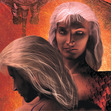On the question of rape
As a writer, I despise the use of rape as a “plot device.” I dislike it as a trope and I dislike it as metaphor. As a simile, I abhor it, because there’s nothing “like” rape other than rape. Which is why when someone uses the word “rape” in reference to my books, my response is…
What?
Now, as I have said before, everyone brings into a book their own values, ideas, thoughts, and experiences, so everyone will have their own interpretation of certain events. This is one of the things that makes reading so wonderful. But when others, even if it’s only a handful people, have such a radically different take on what I intended, I feel like I need to comment. This subject sent me down an interesting road of discovery and made me ask a lot of questions, which I hope I am capable of articulating and answering.
Yes, in my books, there are situations where powerful women coerce other women into having sex with them, and then they both enjoy it. One of the questions that I asked myself was, would these situations be acceptable or interesting to me if I wrote them about a man and woman? And surprisingly, the answer was no. To me, these situations would be markedly different if they happened between a man and a woman. They would become banal, stereotypical, and in some ways, even repulsive.
So this led me to a great deal more of self-reflection. Was I being hypocritical? Was I creating situations in my writing between two women that I would never create between a man and a woman?
And reflecting on these questions led me to understand something that perhaps I have not fully understood or (consciously) explored my whole life. The power and sexual dynamics between a man and a woman, and a woman and a woman, are completely different. They are just not the same.
We live in a culture (pretty much worldwide) in which sex is something men take and women give. This is perpetuated by religion, custom, mores, media, and law. A man who has multiple sexual partners is admired. A woman who has multiple sexual partners is vilified. Sex is expected of men, but discouraged of women. I once sat in a gender studies class in which a young man stated, “I don’t respect a girl who will have sex with me on the first date.” His sense of sexual entitlement was so complete that he was oblivious to the fact that he was also having sex on the first date. It never even crossed his mind.
One of the great freedoms about sexual relationships between women is that all of those unwritten rules and assumptions go away. If a woman has sex with ten men this weekend, she is a slut, (but the guys are studs). If a man has sex with ten women this weekend, he is a stud, (but all ten women are sluts). But if a woman has sex with ten women this weekend, what does that make her? A stud? A slut? Both? Neither?
And really, this ambiguity is what gives me a tremendous amount of freedom in writing my books. And it’s why it works for women, and women only. I could not simply transport men and women to Arianthem and say, “oh, these situations are okay, it’s a fantasy world,” because that would be to discount the entire bulk of history and culture that says otherwise, the ultimate literary conceit. But when the rules are not so clearly defined? That creates openings and endless possibilities.
Shame is another huge issue. Shame and sex are wretchedly intertwined, both in US culture and worldwide. And let’s face it, about 90% of that shame is dumped right on the heads of women. One of the things that I enjoyed about creating Arianthem was creating a world largely devoid of shame. These women like sex, they enjoy it, and they have as much as they can without experiencing the slightest bit of shame. Again, I don’t think I could get away with that when writing about a man and a woman because it would require too large a suspension of belief.
This thought experiment did give me one insight, because I did drag one cultural value into this fantasy world without realizing it. In Arianthem, women are still “givers” of sex, even when they’re takers. Not one of the very powerful women (e.g. Maeva, Ingrid, Hel) is satisfied with merely satisfying themselves. They are not truly empowered until they have brought their partners along for the ride.
So let me head off a few criticisms before I finish. I am not saying that women can’t be rapists. They most certainly can. They can rape men, they can rape other women, and they can be child molesters. Women are not paragons of virtue above such acts (although statistically, they are far less likely to commit them). That is not my point.
My point is, I have created a utopian world which is not constrained by traditional roles and stereotypes, one in which women have a tremendous amount of sexual freedom, are not hindered by shame, and sometimes see sex as a romantic act and other times as simply a physical release. I like to explore all the power dynamics between women, as well as seduction in all its many intriguing forms. I won’t engage in the non-apology of “I’m sorry you were offended…” But if anything in the books has triggered any type of negative reaction in you thus far–
FOR GOD’S SAKE, DON’T READ THE EIGHTH BOOK!



